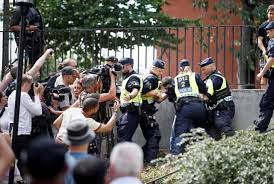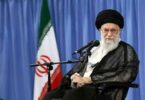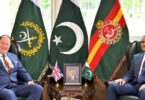BRUSSELS (Agencies): The European Union joined several Muslim nations on Saturday in condemning the latest incident of desecration of the Holy Quran in Sweden while the Organisation of Islamic Cooperation (OIC) would be convening an emergency meeting on the matter next week.
The censure comes after a man, who fled from Iraq to Sweden several years ago, tore up and burned the Holy Quran outside Stockholm’s central mosque on Wednesday— the first day of Eidul Azha in the country. He has been charged by Swedish police with agitation against an ethnic or national group and a violation of a ban on fires that has been in place in Stockholm since mid-June. The act has drawn strong criticism from several countries, including Pakistan, Turkiye, Jordan, Palestine, Saudi Arabia, Morocco, Iraq and Iran.
In its condemnation issued today, the EU said the act of burning the Holy Quran or any other holy book was “offensive, and disrespectful and a clear act of provocation.” “Manifestations of racism, xenophobia and related intolerance have no place in Europe,” Nabila Massrali, the EU spokesperson for foreign affairs and security policy, said in a statement. “The EU joins the Swedish Ministry of Foreign Affairs in its strong rejection of the burning of a [copy of the Holy] Quran by an individual in Sweden. This act in no way reflects the opinions of the European Union.”
She added, “It is even more deplorable that such an act was carried out on the important Muslim celebration of Eidul Azha.” Meanwhile, the OIC announced a day after the incident that it would be convening an emergency meeting of its executive committee next week to discuss the matter. The intergovernmental organisation of 57 countries said in a statement that the meeting had been called by Saudi Arabia in its capacity as chair of the Islamic Summit Conference and would take place at the OIC headquarters in the Saudi city of Jeddah.
The emergency meeting would also go over the procedures for dealing with the fallout from the incident, it added. In an earlier statement, the OIC strongly condemned the incident, saying that such an act contradicted “international efforts to spread the values of tolerance, moderation, and renunciation of extremism.” It also reiterated its condemnation of such “reprehensible acts that some extremists deliberately commit” and urged relevant governments around the world to “take effective measures to prevent its recurrence”.
The OIC also emphasised the importance of adhering to the UN Charter in terms of promoting and encouraging respect for, and observance of, human rights and fundamental freedoms for all at the global level. Meanwhile, Pakistan, too, strongly condemned the “despicable act”, stressing that “such wilful incitement to discrimination, hated and violence cannot be justified under the pretext of freedom of expression and protest”. “The recurrence of such Islamophobic incidents during the last few months in the West calls into serious question the legal framework which permits such hate-driven actions. “We reiterate that the right to freedom of expression and opinion does not provide a license to stoke hatred and sabotage inter-faith harmony,” the Foreign Office said in a statement on Thursday.
It further stated that Pakistan’s concerns about the incident were being conveyed to Sweden and urged the international community and the national governments to undertake “credible and concrete measures to prevent the rising incidents of xenophobia, Islamophobia and anti-Muslim hatred”. Separately, a statement issued by the president’s office termed the incident “painful”. It said the act had “deeply hurt the sentiments of billions of Muslims, [and] every state must take measures for the prevention of such Islamophobic acts”.
On Friday, thousands of supporters of Shia cleric Moqtada al-Sadr held a protest outside of the Swedish Embassy in Baghdad and demanded an end to diplomatic ties. The protesters also briefly breached the embassy. Iraq’s foreign ministry also summoned Sweden’s ambassador on Thursday, urging the Swedish government to hand the man over so he could be tried in accordance with Iraqi law.
Kuwait, too, summoned Sweden’s envoy, based in the United Arab Emirates, over the incident, after the UAE and also called in the country’s diplomatic representatives. “The deputy minister of foreign affairs handed the Swedish ambassador an official protest note containing the condemnation and denunciation of the State of Kuwait for the burning of a copy of the Holy Qoran by an extremist,” the foreign ministry said. The note also denounced Sweden for repeatedly permitting the act, the foreign ministry said.
The United States also condemned the incident but said that issuing the permit for the protest outside the Stockholm mosque supported freedom of expression and was not an endorsement of the action. Turkish President Recep Tayyip Erdogan, as well as the Turkish foreign minister, have condemned the incident. For his part, Swedish Prime Minister Ulf Kristersson distanced himself from the act.
“It is difficult to say what the consequences will be. I think there are many people who have reason to reflect,” Kristersson told a press conference. “This is a serious security question. There’s no need to insult other people,” the right-wing head of government said. “I think that just because some things are legal, they are not necessarily appropriate.” In an apparent reference to protesters breaching the Swedish embassy in Iraq, he said, “It is of course completely unacceptable to have people who unlawfully break into Swedish embassies in other countries.”







